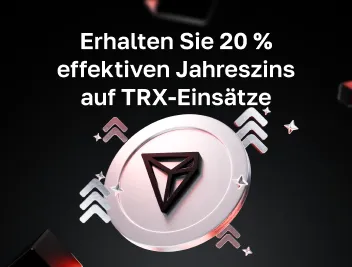
Bitcoin ETFs: Was sind sie?
Inhaltsverzeichnis
Es ist schwierig, sich das Investitionsklima des Krypto-Raums ohne Bitcoin vorzustellen, dessen Popularität das Wachstum von Diskussionen über ein völlig neues Anlagekonzept, das Konzept von börsengehandelten Fonds mit Bitcoin oder einfach Bitcoin ETFs, angeregt hat. In diesem Artikel erklären wir, was Bitcoin ETFs sind, welche Bitcoin-Preisprognose mit ETFs und wie ETSs Bitcoin beeinflussen.
Bitcoin ETFs: Die Bedeutung und Arbeitsprinzipien
Was ist Bitcoin ETF und wie funktionieren sie in einem Kryptomarkt? Um genauere Antworten auf diese Fragen zu geben, müssen Sie zunächst die Gesamteigenschaften der ETFs als vollständiges Handelsinstrument bestimmen. Exchange Traded Funds (ETF) sind Anlageinstrumente, die Aktien ähneln, mit der Ausnahme, dass sie eher einem Index oder einem anderen Basiswert als bestimmten Unternehmen folgen.
Hier ist eine Übersicht über Bitcoin-ETFs. Bitcoin ETF ist eine besondere Art von börsengehandeltem Fonds, der Anlegern eine einfache und regulierte Möglichkeit bietet, den Preis von Bitcoin auf dem Kryptowährungsmarkt zu handeln. Auf diese Weise können Investoren oder Organisationen auf Bitcoin zugreifen und die Komplikationen und Risiken vermeiden, die mit dem direkten Besitz und der Speicherung der Kryptowährung verbunden sind.
Was sind die Bitcoin-ETFs in einfachen Worten? Sie sind börsengehandelte Fonds, die nur BTC enthalten. Krypto-Investoren können ihr Vermögen erhöhen und von der Wertsteigerung von Kryptowährungen profitieren, indem sie Anteile eines solchen Fonds kaufen, anstatt selbst Bitcoins kaufen und halten zu müssen.
Die grundlegenden Konzepte funktionierender Bitcoin-ETFs sind nicht besonders schwierig, aber Sie sollten dennoch Ihre Vertrautheit mit Kryptowährungen und Ihr Verständnis für die Volatilität des Marktes bewerten. Um eine ETF-Aktie zu kaufen, müssen Sie ein Brokerage-Konto erstellen. Es ist wichtig zu beachten, dass die Öffnungsbedingungen von Land zu Land variieren können. In der Regel reicht es aus, dem Broker ein Ausweisdokument zur Verfügung zu stellen. Danach müssen Sie nur noch den Ticker (Kurzbezeichnung des Anlageinstruments) in der Liste finden und den Anteil der Bitcoin-ETFs angeben, die Sie jetzt kaufen möchten.
Arten von Bitcoin ETFs
Aufgrund seiner Neuheit sind viele Menschen verwirrt über die Wirksamkeit und Zuverlässigkeit von Bitcoin-ETFs. Bevor Sie mit der Verwendung des Fonds beginnen, müssen Sie so viele Informationen wie möglich über die Grundsätze seiner Funktionsweise und seine Typen erhalten, die offensichtlich erhebliche Unterschiede untereinander aufweisen.
Die größten Bitcoin ETFs werden in zwei grundlegende Typen unterteilt: spot ETFs und futures ETFs.
- Spot auf Bitcoin ETFs
Eine spezielle Art von börsengehandeltem Fonds, der Anlegern derzeit direkten Zugang zum Preis von Bitcoin bietet. Es enthält normalerweise echtes Bitcoin als primäres Asset. Jeder Bitcoin-ETF wird unmittelbar von dem Preis beeinflusst, zu dem Bitcoins am Handelsplatz gehalten werden. Der Kauf von Aktien des Spot BTC ETF gibt Anlegern Zugang zu einer "Projektion" des tatsächlichen Bitcoin, aber sie besitzen eigentlich keine Kryptowährung.
- Futures auf Bitcoin ETFs
Eine Art von ETFs, die Bitcoin nicht direkt besitzt. Die Investition in Futures-ETFs ermöglicht es Anlegern, indirekt auf den Preis von Bitcoin in der Zukunft zu wetten. Sie erwerben einen Anteil an dem Fonds, der Bitcoin-Futures-Kontrakte hält, die direkt Schwankungen am Futures-Markt unterliegen.
Im Allgemeinen ermöglicht diese Art von Fonds Anlegern, auf zukünftige Bitcoin-Kursbewegungen zu spekulieren, ohne die Kryptowährung selbst kaufen zu müssen.

Vorteile der Investition in Bitcoin ETFs
Wie hat sich die Schaffung von Bitcoin-ETFs auf den Finanzmarkt für Kryptowährungen ausgewirkt? Viele, die sich für das Thema interessieren, antworten zuversichtlich, dass diese Fonds das Hauptzeichen für die kontinuierliche Entwicklung der Krypto-Investmentbranche sind. Bitcoin-ETFs haben bei Händlern und Anlegern gleichermaßen großes Interesse geweckt, da sie eine vereinfachte und regulierte Möglichkeit bieten, an Bitcoin-Investitionen teilzunehmen. Hier sind einige bemerkenswerte Vorteile von Bitcoin-ETFs, die Ihnen dabei helfen, sicherzustellen, dass Ihre Ersparnisse sinnvoll ausgegeben werden. Mal sehen!
- Reduzierung von Risiken
Sind alle Bitcoin-ETFs sicher zu verwenden? Bitcoin-ETFs unterliegen der regulatorischen Aufsicht durch Banken, die Bitcoin-ETFs wünschen, was Anlegern ein gewisses Maß an Schutz und Transparenz bietet. Diese regulatorische Aufsicht kann dazu beitragen, Bedenken hinsichtlich Betrug und Marktmanipulation zu verringern, die auf unregulierten Kryptowährungsmärkten häufiger auftreten können.
- Einfache Bedienung
Da ETFs an konventionellen Aktienmärkten gehandelt werden, ist es für reguläre Anleger einfacher, mit Bitcoin verbundene Vermögenswerte über ihre aktuellen Brokerage-Konten zu kaufen und zu verkaufen. Anleger, die Bedenken hinsichtlich der Verwendung von Bitcoin-ETFs haben oder mit diesen nicht vertraut sind, finden diese Zugänglichkeit möglicherweise besonders ansprechend.
- Verständlicher Anlageprozess
Die instabile Welt der Kryptowährungen und etablierten Finanzmärkte kann dank Bitcoin-ETFs verbunden werden. Sie können mehr Investoren anziehen, indem sie einen unkomplizierten und regulierten Anlageprozess anbieten.
Risiken beim Investieren in Bitcoin ETFs
Sind Bitcoin-ETFs eine gute Anlagemethode? Die Antwort wird für jeden anders sein, da jeder Benutzer seine eigene Anlagestrategie entwickeln und alle Risiken und Vorteile bestimmter Arten der Investition in Kryptowährung klar einschätzen muss. Die besten Bitcoin-ETFs eröffnen viele neue Anlagemöglichkeiten und es ist wichtig, sich aller möglichen Risiken bewusst zu sein, bevor man sich mit diesen Arten von Krypto-Investitionen befasst.
- Anpassungsprobleme in verschiedenen Ländern
Jedes Land hat seinen eigenen regulatorischen Rahmen, der die Verwaltung von ETFs erschweren oder sogar verhindern kann, dass sie überhaupt funktionieren. Dies gilt insbesondere für Spot-ETFs, da die Bedenken im Zusammenhang mit Anlegerschutz, Marktmanipulation und anderen regulatorischen Fragen bestehen.
- Die hohen Wartungskosten und das mangelnde Kryptokenntnis
Die Verwendung beider Arten von Bitcoin-ETFs birgt eigene Risiken, die mit hohen Kosten verbunden sind. Einerseits hängen die Kosten für Spot-ETFs vom instabilen Preis von Bitcoin ab. Andererseits ist die Funktionsweise von Futures-ETFs ziemlich kompliziert herauszufinden, da sie in Bezug auf den Futures-Markt arbeiten, der an sich komplex und schwer zu verstehen ist.
Letzteres impliziert eine zusätzliche Nuance der Verwendung von ETFs, beispielsweise mangelndes Wissen, da das Thema BTC-ETFs heute relativ neu und nicht so zugänglich ist, wie wir es gerne hätten. Es lohnt sich, sich auf Ihre Handelserfahrung, Anlageziele und Ihr Wissen über den Kryptowährungsmarkt zu konzentrieren, um Bitcoin-ETFs effizient und korrekt einzusetzen.
Obwohl Bitcoin-ETFs einen bequemen und regulierten Zugang zu Krypto bieten, haben sie bestimmte Nachteile, darunter das Vorhandensein von Verwaltungsgebühren und die Exposition gegenüber Marktvolatilität. Denken Sie daran, dass Sie alle Vor- und Nachteile verstehen und alle möglichen Risiken beim Investieren in Krypto berücksichtigen sollten.
Tipps zum Investieren in Bitcoin ETFs
-
Analysieren Sie Ihre Prioritäten und wählen Sie die geeignete Art von Bitcoin-ETFs aus.
-
Überprüfen Sie so viele Informationen wie möglich über die bevorzugte: Arbeitsbedingungen, Wartungskosten und Sicherheitsoptionen.
-
Entwickeln Sie Ihre Anlagestrategie. Eine Geldanlage ohne vorbereiteten Plan zu beginnen, ist ein riskantes Geschäft.
Was sind Bitcoin-ETFs und welche Rolle spielen sie jetzt im Kryptobereich? Jetzt haben Sie die Antworten gefunden! Wir hoffen, dass dieser Artikel hilfreich war und Sie etwas Neues daraus gelernt haben. Erweitern Sie Ihren Krypto-Horizont und prüfen Sie relevante Themen gemeinsam mit Cryptomus!
Simplify Your Crypto Journey
Möchten Sie Kryptowährungen speichern, senden, akzeptieren, einsetzen oder handeln? Mit Cryptomus ist alles möglich – melden Sie sich an und verwalten Sie Ihre Kryptowährungsgelder mit unseren praktischen Tools.
Erste Schritte









